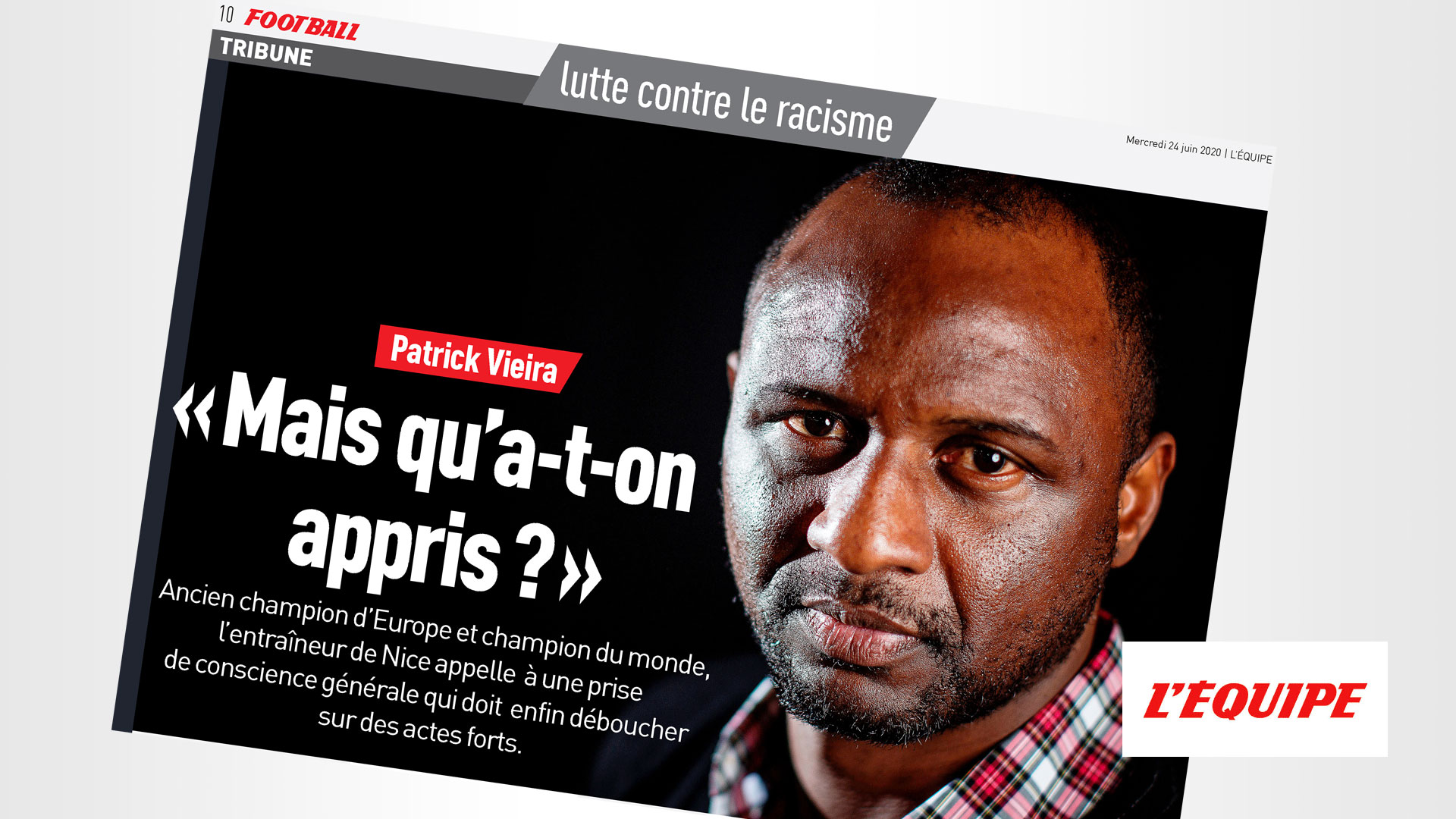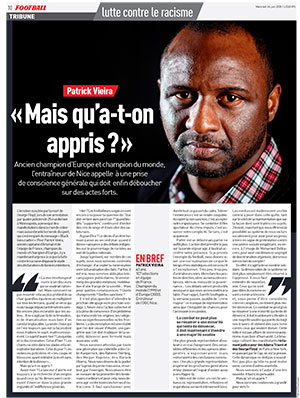
Media
Vieira: 'At the dawn of a new era'
Guest columnist in the French sports daily L'Equipe on Wednesday, OGC Nice coach Patrick Vieira wrote a heartfelt editorial calling for unified action in the face of all forms of discrimination, a truly global pandemic.
 The emotion generated by the death of George Floyd, when he was arrested by four policemen on 25 May in Minneapolis, provoked demonstrations around the world, but also shook the foundations of the world of sport, which embraced the message "Black lives matter".
The emotion generated by the death of George Floyd, when he was arrested by four policemen on 25 May in Minneapolis, provoked demonstrations around the world, but also shook the foundations of the world of sport, which embraced the message "Black lives matter".
For Patrick Vieira, former captain of Arsenal and the France national team, a world and European champion, there is now an urgent need for the fight against racism to go beyond mere well-intentioned declarations.
Vieira: 'At the dawn of a new era'
"Overly passionate emotions can be detrimental to a rational debate.
But how can one not feel this deep down in one's soul, as more and more injustices occur in all walks of life, when a virus that has been ravaging us for so many centuries seems even more incurable than others?
This is not victimisation or dramatization, but an implacable truth. However the way we treat this subject unfortunately, is most certainly not. What was it in the past? Quotas and discrimination. And then? Racist chanting in stadiums and trivialized xenophobia. And now? Police violence and "assault and battery resulting in death without intent to cause it"...
And what have we learned? From the past? The whistle-blower is still looking for a job when those he denounced continue to exercise their rights with the impunity and indifference.
And then? Footballers who are victims of monkey chants are still asking themselves "What should we do when it happens again?" when said "fans" continue to imitate monkey noises and perform Nazi salutes.
And now? The death of a human being takes a backseat as it gives rise to distasteful debates about the percentage of racists in the national police force.
Until now, in the face of many of these subjects, we have been happy to debate, to accept the minimisation or even trivialisation of the facts. Sometimes, it is true, we have gone further: advertising campaigns, brainstorming by the authorities, a fringe of society even moved to action... But what are the real consequences? What changes have been made? What sanctions have been imposed?
It is no longer a question of waiting for the next scandal or the next opinion poll.
The time has come for collective action and collective awareness of a problem that transcends origins, socio-professional classes or national borders.
Discrimination is a reality that we must stop avoiding, a gangrene that must be eradicated from society, firmly denounced by everyone.
A whole generation that identifies with Colin Kaepernick, Raheem Sterling, Megan Rapinoe and Barack Obama expect it of us. We owe it to ourselves to guide them by speaking out but, above all, by leading by example. We must be in a position to promise them a better tomorrow, and to do so, we must act against all forms of discrimination. Anything that steps outside the rules must be swiftly and effectively dealt with.
To tolerate intolerance is to be guilty.
Accepting non-punishment means accepting that we are powerless. Accepting to look on as a crime goes unpunished is accepting to be complicit to the act. To remain silent is to acquiesce.
Talking is a start, but talk is no longer enough. Action must take precedence over words, and in order to act, we need to be seen. If I take football as an example, we must aim to normalise what time and statistics have confined to the exceptional: very few, too few, black coaches. The same goes for club boards, and the same goes for the decision makers and governing bodies...
Debates will also be more productive because we will be invited to take part. Gareth Southgate last week described this lack of representation and the unequal opportunities for reaching these positions as a ‘major crime’.
The fight must no longer be limited to a minority that tries to denounce it, but must now be extended to the unified majority.
Greater representation would lead to real change. Different understanding and divergent opinions would be expressed, but would lead to common conclusions.
Greater representation would inspire future generations and give them hope to reach these heights themselves. The aim is to create a virtuous circle where representation, reflection and inspiration will be intimately linked.
The media obviously has a central role to play in this quest, both in terms of representation and in the way these subjects are treated. I reiterate: as long as we give the system the opportunity to exclude us socially for taking a knee in protest against unequal social justice, or, like Mohamed Belkacemi, for having dared to denounce a project of organised discrimination, then we will never progress! It is now a question of showing solidarity: the denunciation of this system must no longer be reserved simply for the oppressed. We need to hear new voices. Those who are not the target of racism are, at the very least, witness to it and, at the risk of being considered accomplices, must no longer remain silent. The fight must no longer be limited to a minority that tries to denounce it, but must now be extended to the united majority that calls out discrimination and obtains sanctions against those who want to divide. This struggle is not one of certain communities but for all humanity. The cultural mix of demonstrators demanding justice for Adama Traoré and George Floyd, from Paris to New York, via Cape Town, is proof of this.
This movement must not run out of steam, nor must it end in vain, like others before it.
We are at the dawn of a new era.
But what have we learned?
We must grow to live!"
Patrick VIEIRA


